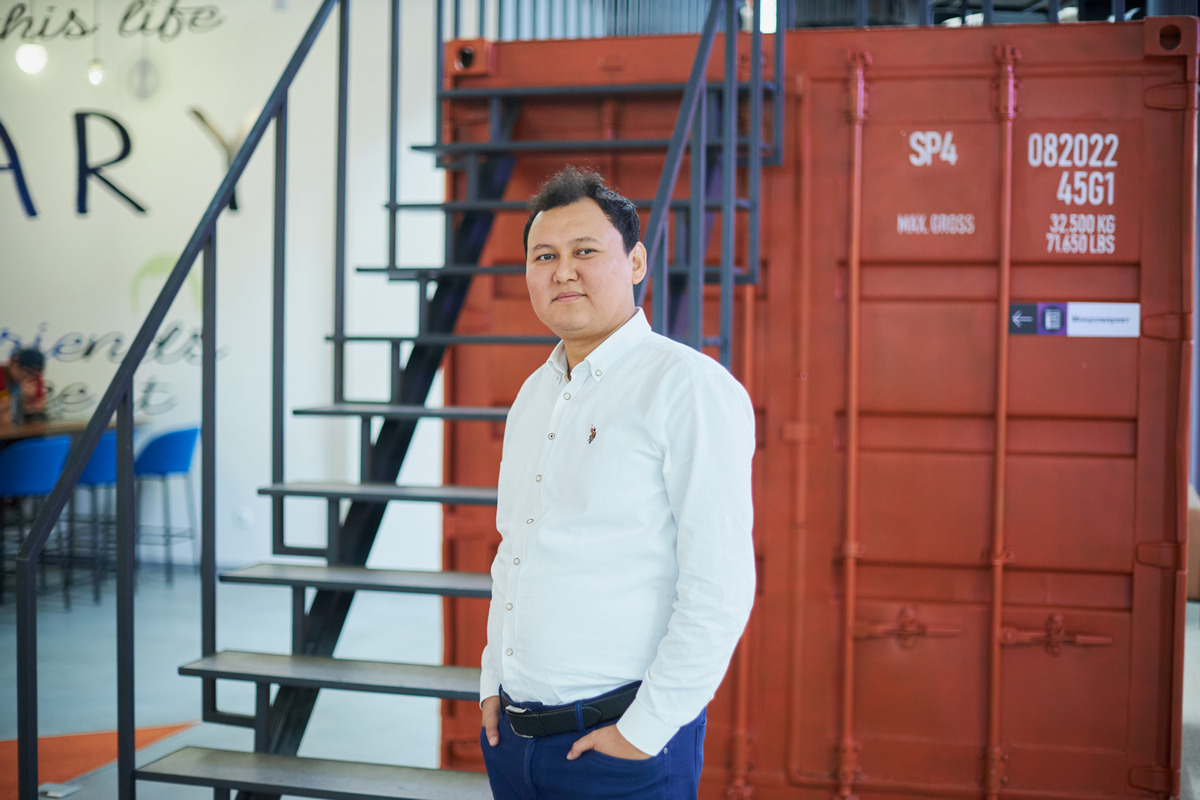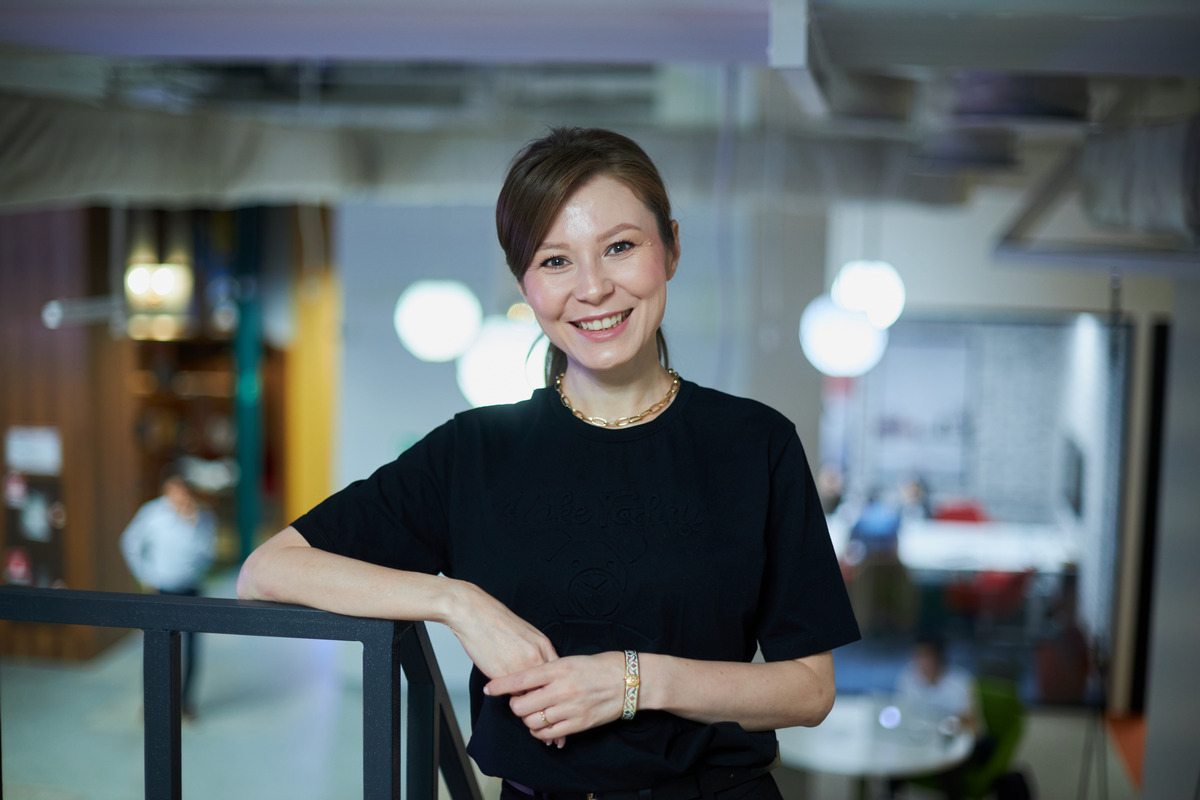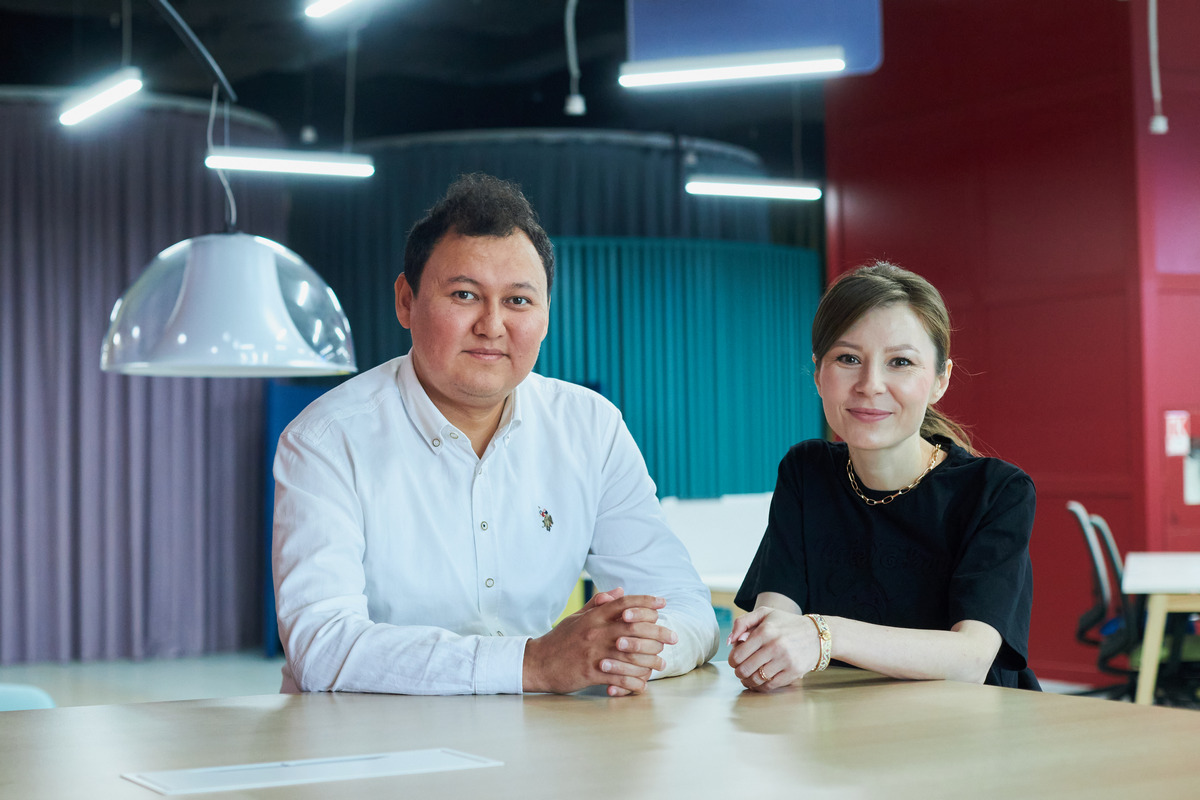Afterward, Askhat decided to transition into the consulting business but didn’t completely abandon IT. Five years ago, EZapp was introduced—a mobile application designed for order management in distribution companies. In March 2023, EZ Factor was integrated into it. This platform allows distributors to access financing through factoring, which comprises a range of financial services for producers and suppliers involved in trade activities on deferred payment terms.
In an interview for the collaborative initiative between Digital Business and Astana Hub, titled “100 Startup Stories of Kazakhstan,” Askhat discussed his approach to managing two startups, the rationale behind introducing a factoring project in Kazakhstan, his strategies for financing distributors, and his methods for handling risks.
“Venturing into a fresh market with a novel product can be a risky strategy. Despite investing several million dollars, it may lead to nothing but a negative experience”
– After an unsuccessful experience with the project management system, you successfully established a consulting business that generates substantial income. Why did you decide to embark on a startup once more?
– I’ve always aspired to craft a product without significant growth limitations, and IT solutions offer the best scalability. I remained in a perpetual quest for a promising concept that could be realized. It was during one of my consulting projects that I crossed paths with two developer brothers who proposed automating order management for FMCG distributors. Although the idea wasn’t entirely novel, I made the decision to delve into it extensively.

Many software development companies predominantly provide lifelong licenses, which can be prohibitively expensive for SMEs. Consequently, many SMEs resort to manual record-keeping in notebooks. To address this issue, I’ve embarked on the development of a mobile application. This application allows sales representatives of distributors to place orders swiftly, with the orders promptly sent to the warehouse for immediate processing. This approach significantly accelerates the logistics chain, shrinking the typical one-day cycle from order receipt to delivery to just a matter of hours.
Additionally, I’ve incorporated several valuable features into the application. These include the ability to track site visits on a map, generate photo reports for these visits, capture images of the goods, and seamlessly synchronize with all configurations of the 1C accounting system. This integration has streamlined the onboarding process for distributors, enabling them to connect to our product in a matter of minutes.
Of utmost significance is our decision to offer monthly licenses. These licenses are available at varying price points, ranging from 2 to 10 thousand tenges per connected device, contingent on the selected tariff.
– Was it profitable?
– In the initial six months, we successfully integrated 80 companies and quickly achieved operational profitability. We experienced steady growth until a certain moment when everything suddenly came to a halt.
– What happened?
– A rising number of similar services began emerging, not just in Kazakhstan but also in Russia, Ukraine, and Belarus. The market became highly competitive, akin to a red ocean. Under such conditions, raising prices without introducing fresh features proved challenging. Yet, introducing new features necessitated funding, with uncertainty about whether these features would yield the desired results and profitability. This created a closed-loop dilemma.

– How did you decide to overcome it?
– I began contemplating the launch of a new product. I had a concept in mind for introducing Store Check, a type of retail analysis crucial for monitoring store operations’ effectiveness. I believed that implementing such solutions in markets beyond Kazakhstan, like the USA, had the potential to yield a tenfold increase in revenue, meeting our desired growth objectives.
We pitched this idea to the Silkway Accelerator program in partnership with Astana Hub and Google for Startups. However, the prominent tracker, Artem Azevich, declined it citing the high associated risks. Embarking on a new market with an innovative product can indeed be a bold strategy. Despite the investment of several million dollars, there’s a possibility it may result in a negative experience with no substantial returns.
– So what happened next?
– Artem proposed that I leverage my extensive background in the financial sector, which includes holding managerial positions in banks and microfinance organizations, along with our established distributor network. Given my wealth of experience in data analysis, distribution, and finance, I made the strategic shift toward fintech. To kick start this new venture, I enlisted the expertise of Asel Karabaeva, who possesses profound knowledge of banking legislation, and Olesya Skurdanova, who specializes in marketing analytics at EZapp.

Collectively, we identified the primary challenge faced by distributors, which revolved around financial constraints. Not all producers were willing to offer deferred payments, and obtaining a bank loan entailed a time-consuming process with collateral requirements. We arrived at the decision that we should step in as a quick source of financing for distributors through factoring. This approach could be swiftly implemented since it didn’t necessitate licensing. This marked the inception of EZ FACTOR, with Asel and Olesya joining me as co-founders.
“To access financing, distributors should focus on dealing with fast-moving goods that come with a minimum profit margin of 30%”
– Can you please provide an explanation of what is factoring?
Asel Karabaeva, the co-founder and CEO of EZ FACTOR, joins the discussion
Asel: – In straightforward terms, we have two parties involved: the seller (the goods producer) and the buyer (the distributor). The seller prefers immediate or, ideally, advance payment for their products. However, the buyer may not always be prepared to make payments promptly, often due to various reasons. Our solution involves offering to buy the accounts receivable from the seller, specifically those mentioned in the consignment bill. This transaction can be swiftly executed through an electronic agreement, which can be signed using EDS or through SMS. This quick process enables the deal to be concluded within a matter of seconds.

Asel Karabaeva, the co-founder and CEO of EZ FACTOR
In practice, the scenario unfolds as follows: consider a cookie producer located in Semey, who wishes to expand their sales to Karaganda through distributors. However, the producer is hesitant to offer payment deferrals spanning several weeks or months. This is where we step in, facilitating a win-win solution for all parties involved.
– What is the essence behind this solution?
Asel: – This solution ensures that the producer receives immediate funds from us, which they can then invest in their turnover or development. Meanwhile, the distributor gains access to products for sale. Such products as pastries, snacks, beverages, and household detergents are sold with a markup of 30-40%. Essentially, this marks a profit for the distributor, and the quicker they receive the products, the greater their earning potential. To sustain our services, we apply a 5% fee, which is levied from both the supplier and the buyer.
– From where did you obtain the funds to acquire the distributor’s accounts payable from the supplier?
Askhat: – I personally invested tens of thousands of dollars into the project. Additionally, we secured a similar amount through the Proportunity crowdfunding platform with contributions from business angels. This funding proved sufficient for validating our hypothesis and working with ten initial clients.
It’s important to note that our clients primarily consist of SMEs, and they typically do not require large sums of money. For instance, the average transaction value for the first ten companies that received financing was around 2 million tenge. Generally, we are prepared to offer financial support ranging from 10% to 50% of a company’s monthly turnover when they approach us.
– Do you have specific criteria or limitations when it comes to financing distributors, or are you open to working with any distributor?
Asel: – One of the key criteria is that the company should have been in operation for at least one year. We conduct a comprehensive review of their financial performance, scrutinize legal aspects through various databases, and assess their relationships with suppliers, among other factors. This rigorous evaluation process enables us to gauge the credibility of potential clients effectively.
The distributors should also deal with fast-moving goods that come with a minimum profit margin of 30%. As of today, we have 15 active paying clients.
– How do you manage credit risks?
Askhat: – During the selection process, we aim to keep these risks to a minimum. Over the course of EZapp’s five-year operations, we’ve accumulated substantial data from distributors, including information on their turnovers, profit margins, product turnaround times, the size of their sales teams, and the number of sales points, among other factors. Leveraging this wealth of data, our scoring system allows us to make highly accurate assessments regarding the amount of funding that can be extended to a particular distributor and provides us with a rough estimate of when they are likely to repay it.
– Have there been any cases of delayed payments or instances where repayments were not made at all?
Asel: – We did encounter some instances of technical delays. For example, one of our clients reported that they faced delays in receiving products from the producers, which, in turn, led to a breach of the payment terms. However, they were able to promptly settle the outstanding debt.

Askhat: – We have taken significant measures to ensure robust legal protection. To begin with, we demand guarantees from all the founders of the companies with which we enter into agreements. Furthermore, we possess the authority to initiate a recourse procedure, which entails requiring the supplier to reimburse the funds provided. It’s important to note that we do not extend loans; instead, we finance the transaction between the seller and the buyer. In the event that one party fails to repay the debt, legal obligations under the law require the other party to fulfill the repayment.
“Our goal is to offer not only factoring financing but also to export our scoring system to other markets”
– Your motivation for launching EZ FACTOR was driven by the desire to expand into other markets and potentially achieve tenfold growth. And is this initiative scalable?
Askhat: – We’ve observed the emergence of similar projects worldwide. Factoring isn’t a new concept, but its popularity was hindered by paper-based documentation and complex procedures in the past. However, the advent of digitalization has eliminated many of these barriers and accelerated processes. This positions us to take our project to the global stage.
– Which markets are you contemplating for potential expansion?
Asel: – We have a keen interest in Southeastern Asia, particularly in countries like Bangladesh, the Philippines, and Malaysia. These regions boast a high concentration of small stores and markets, akin to the setup in Kazakhstan, which has led to the development of a robust distributor class. Additionally, we are exploring opportunities in the MENA region, with a particular focus on the UAE. Our strategic direction involves expansion into these regions.

Askhat: – It’s crucial to emphasize that our expansion plans extend beyond merely providing funding to distributors. For instance, such services are not sought after in Europe, where prominent retailers exist, and additional financing is unnecessary.
To tap into these markets, we can introduce offerings aimed at banks and other financial institutions interested in B2B engagements within the FMCG sector and utilizing our scoring system. Our data can be adapted for use across diverse industries, enabling more accurate assessments of loan repayment likelihood. We also plan to integrate AI to improve efficiency.
– Are you considering seeking external investments or utilizing your own capital to implement these ideas?
Askhat: – We are actively considering our options. We require additional capital to expand our factoring services and accommodate the growing demand from companies seeking financing. Currently, we have requests for substantial sums that exceed our current capacity.
Moreover, investments will be essential for the development of our products, including electronic factoring and scoring systems with integrated AI capabilities designed to reduce human intervention. Currently, we rely on manual updates for certain coefficients and document preparation for transactions, which we aim to streamline with enhanced automation.
– What amount of funding are you looking to secure?

Askhat: – Currently, based on our cost sheet, we require USD 360,000. However, this figure tends to grow incrementally each month as we continually plan for enhancements. We assess the overall value of our project at USD 4.5 million, which signifies our status as a profitable company.
Afterward, Askhat decided to transition into the consulting business but didn’t completely abandon IT. Five years ago, EZapp was introduced—a mobile application designed for order management in distribution companies. In March 2023, EZ Factor was integrated into it. This platform allows distributors to access financing through factoring, which comprises a range of financial services for producers and suppliers involved in trade activities on deferred payment terms.
In an interview for the collaborative initiative between Digital Business and Astana Hub, titled “100 Startup Stories of Kazakhstan,” Askhat discussed his approach to managing two startups, the rationale behind introducing a factoring project in Kazakhstan, his strategies for financing distributors, and his methods for handling risks.
“Venturing into a fresh market with a novel product can be a risky strategy. Despite investing several million dollars, it may lead to nothing but a negative experience”
– After an unsuccessful experience with the project management system, you successfully established a consulting business that generates substantial income. Why did you decide to embark on a startup once more?
– I’ve always aspired to craft a product without significant growth limitations, and IT solutions offer the best scalability. I remained in a perpetual quest for a promising concept that could be realized. It was during one of my consulting projects that I crossed paths with two developer brothers who proposed automating order management for FMCG distributors. Although the idea wasn’t entirely novel, I made the decision to delve into it extensively.

Many software development companies predominantly provide lifelong licenses, which can be prohibitively expensive for SMEs. Consequently, many SMEs resort to manual record-keeping in notebooks. To address this issue, I’ve embarked on the development of a mobile application. This application allows sales representatives of distributors to place orders swiftly, with the orders promptly sent to the warehouse for immediate processing. This approach significantly accelerates the logistics chain, shrinking the typical one-day cycle from order receipt to delivery to just a matter of hours.
Additionally, I’ve incorporated several valuable features into the application. These include the ability to track site visits on a map, generate photo reports for these visits, capture images of the goods, and seamlessly synchronize with all configurations of the 1C accounting system. This integration has streamlined the onboarding process for distributors, enabling them to connect to our product in a matter of minutes.
Of utmost significance is our decision to offer monthly licenses. These licenses are available at varying price points, ranging from 2 to 10 thousand tenges per connected device, contingent on the selected tariff.
– Was it profitable?
– In the initial six months, we successfully integrated 80 companies and quickly achieved operational profitability. We experienced steady growth until a certain moment when everything suddenly came to a halt.
– What happened?
– A rising number of similar services began emerging, not just in Kazakhstan but also in Russia, Ukraine, and Belarus. The market became highly competitive, akin to a red ocean. Under such conditions, raising prices without introducing fresh features proved challenging. Yet, introducing new features necessitated funding, with uncertainty about whether these features would yield the desired results and profitability. This created a closed-loop dilemma.

– How did you decide to overcome it?
– I began contemplating the launch of a new product. I had a concept in mind for introducing Store Check, a type of retail analysis crucial for monitoring store operations’ effectiveness. I believed that implementing such solutions in markets beyond Kazakhstan, like the USA, had the potential to yield a tenfold increase in revenue, meeting our desired growth objectives.
We pitched this idea to the Silkway Accelerator program in partnership with Astana Hub and Google for Startups. However, the prominent tracker, Artem Azevich, declined it citing the high associated risks. Embarking on a new market with an innovative product can indeed be a bold strategy. Despite the investment of several million dollars, there’s a possibility it may result in a negative experience with no substantial returns.
– So what happened next?
– Artem proposed that I leverage my extensive background in the financial sector, which includes holding managerial positions in banks and microfinance organizations, along with our established distributor network. Given my wealth of experience in data analysis, distribution, and finance, I made the strategic shift toward fintech. To kick start this new venture, I enlisted the expertise of Asel Karabaeva, who possesses profound knowledge of banking legislation, and Olesya Skurdanova, who specializes in marketing analytics at EZapp.

Collectively, we identified the primary challenge faced by distributors, which revolved around financial constraints. Not all producers were willing to offer deferred payments, and obtaining a bank loan entailed a time-consuming process with collateral requirements. We arrived at the decision that we should step in as a quick source of financing for distributors through factoring. This approach could be swiftly implemented since it didn’t necessitate licensing. This marked the inception of EZ FACTOR, with Asel and Olesya joining me as co-founders.
“To access financing, distributors should focus on dealing with fast-moving goods that come with a minimum profit margin of 30%”
– Can you please provide an explanation of what is factoring?
Asel Karabaeva, the co-founder and CEO of EZ FACTOR, joins the discussion
Asel: – In straightforward terms, we have two parties involved: the seller (the goods producer) and the buyer (the distributor). The seller prefers immediate or, ideally, advance payment for their products. However, the buyer may not always be prepared to make payments promptly, often due to various reasons. Our solution involves offering to buy the accounts receivable from the seller, specifically those mentioned in the consignment bill. This transaction can be swiftly executed through an electronic agreement, which can be signed using EDS or through SMS. This quick process enables the deal to be concluded within a matter of seconds.

Asel Karabaeva, the co-founder and CEO of EZ FACTOR
In practice, the scenario unfolds as follows: consider a cookie producer located in Semey, who wishes to expand their sales to Karaganda through distributors. However, the producer is hesitant to offer payment deferrals spanning several weeks or months. This is where we step in, facilitating a win-win solution for all parties involved.
– What is the essence behind this solution?
Asel: – This solution ensures that the producer receives immediate funds from us, which they can then invest in their turnover or development. Meanwhile, the distributor gains access to products for sale. Such products as pastries, snacks, beverages, and household detergents are sold with a markup of 30-40%. Essentially, this marks a profit for the distributor, and the quicker they receive the products, the greater their earning potential. To sustain our services, we apply a 5% fee, which is levied from both the supplier and the buyer.
– From where did you obtain the funds to acquire the distributor’s accounts payable from the supplier?
Askhat: – I personally invested tens of thousands of dollars into the project. Additionally, we secured a similar amount through the Proportunity crowdfunding platform with contributions from business angels. This funding proved sufficient for validating our hypothesis and working with ten initial clients.
It’s important to note that our clients primarily consist of SMEs, and they typically do not require large sums of money. For instance, the average transaction value for the first ten companies that received financing was around 2 million tenge. Generally, we are prepared to offer financial support ranging from 10% to 50% of a company’s monthly turnover when they approach us.
– Do you have specific criteria or limitations when it comes to financing distributors, or are you open to working with any distributor?
Asel: – One of the key criteria is that the company should have been in operation for at least one year. We conduct a comprehensive review of their financial performance, scrutinize legal aspects through various databases, and assess their relationships with suppliers, among other factors. This rigorous evaluation process enables us to gauge the credibility of potential clients effectively.
The distributors should also deal with fast-moving goods that come with a minimum profit margin of 30%. As of today, we have 15 active paying clients.
– How do you manage credit risks?
Askhat: – During the selection process, we aim to keep these risks to a minimum. Over the course of EZapp’s five-year operations, we’ve accumulated substantial data from distributors, including information on their turnovers, profit margins, product turnaround times, the size of their sales teams, and the number of sales points, among other factors. Leveraging this wealth of data, our scoring system allows us to make highly accurate assessments regarding the amount of funding that can be extended to a particular distributor and provides us with a rough estimate of when they are likely to repay it.
– Have there been any cases of delayed payments or instances where repayments were not made at all?
Asel: – We did encounter some instances of technical delays. For example, one of our clients reported that they faced delays in receiving products from the producers, which, in turn, led to a breach of the payment terms. However, they were able to promptly settle the outstanding debt.

Askhat: – We have taken significant measures to ensure robust legal protection. To begin with, we demand guarantees from all the founders of the companies with which we enter into agreements. Furthermore, we possess the authority to initiate a recourse procedure, which entails requiring the supplier to reimburse the funds provided. It’s important to note that we do not extend loans; instead, we finance the transaction between the seller and the buyer. In the event that one party fails to repay the debt, legal obligations under the law require the other party to fulfill the repayment.
“Our goal is to offer not only factoring financing but also to export our scoring system to other markets”
– Your motivation for launching EZ FACTOR was driven by the desire to expand into other markets and potentially achieve tenfold growth. And is this initiative scalable?
Askhat: – We’ve observed the emergence of similar projects worldwide. Factoring isn’t a new concept, but its popularity was hindered by paper-based documentation and complex procedures in the past. However, the advent of digitalization has eliminated many of these barriers and accelerated processes. This positions us to take our project to the global stage.
– Which markets are you contemplating for potential expansion?
Asel: – We have a keen interest in Southeastern Asia, particularly in countries like Bangladesh, the Philippines, and Malaysia. These regions boast a high concentration of small stores and markets, akin to the setup in Kazakhstan, which has led to the development of a robust distributor class. Additionally, we are exploring opportunities in the MENA region, with a particular focus on the UAE. Our strategic direction involves expansion into these regions.

Askhat: – It’s crucial to emphasize that our expansion plans extend beyond merely providing funding to distributors. For instance, such services are not sought after in Europe, where prominent retailers exist, and additional financing is unnecessary.
To tap into these markets, we can introduce offerings aimed at banks and other financial institutions interested in B2B engagements within the FMCG sector and utilizing our scoring system. Our data can be adapted for use across diverse industries, enabling more accurate assessments of loan repayment likelihood. We also plan to integrate AI to improve efficiency.
– Are you considering seeking external investments or utilizing your own capital to implement these ideas?
Askhat: – We are actively considering our options. We require additional capital to expand our factoring services and accommodate the growing demand from companies seeking financing. Currently, we have requests for substantial sums that exceed our current capacity.
Moreover, investments will be essential for the development of our products, including electronic factoring and scoring systems with integrated AI capabilities designed to reduce human intervention. Currently, we rely on manual updates for certain coefficients and document preparation for transactions, which we aim to streamline with enhanced automation.
– What amount of funding are you looking to secure?

Askhat: – Currently, based on our cost sheet, we require USD 360,000. However, this figure tends to grow incrementally each month as we continually plan for enhancements. We assess the overall value of our project at USD 4.5 million, which signifies our status as a profitable company.






